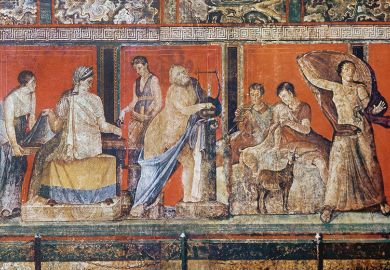We can all agree that universities should be places where critical thinking is embraced, developed and practised. Unfortunately, those who manage higher education institutions and those who work within them just don’t seem very good at it.
I was once – albeit briefly – a member of a senior team in a UK business school. I was present at many meetings where we were presented with dubious reports and bizarre strategies (as a strategy academic I have some knowledge of strategy) that we were expected to accept unquestioningly, merely because they originated from an authoritative source: usually the vice-chancellor’s office.
The unspoken rule seemed to be that, as a senior team member, my duty was to support initiatives and changes that I didn’t believe in. To challenge them resulted in being labelled “against change”, a charge that implicitly questioned your right to senior team status. Leaders, it seemed, were those that championed change, no matter how wrongheaded it appeared.
These experiences were in stark contrast to how I was teaching strategy to my MBA students at the time. I tried to emphasise to them the importance of thinking critically when confronted with organisational strategies: not to accept them at face value but to seek out and question the underpinning assumptions. I encouraged them to apply models and theories knowing that they have limitations as well as strengths. Yet the strategies I was exposed to on the senior team were often justified through ham-fisted use of simplistic management models; I often reflected that if my MBA students had produced those strategies, they would be marked as fails.
Another example of the hollowness of universities’ claims around critical thinking can be seen in student assessments. Rare is the social science student who is not asked to engage their critical faculties. They are routinely instructed to critically evaluate, critically analyse and critically discuss. And yet neither the academic who inserts the word “critical” into essay instructions nor the students required to demonstrate the quality have any real idea what the difference is between “critically” assessing and just assessing.
The most common response to such wording by both students and faculty is to ignore it. Students find attempting any form of criticality in their work a high-risk approach, as they tend to associate it with negativity. And while faculty may instinctively feel that their students should engage deeply with the material they encounter – interpreting benefits as well as problems, revealing assumptions and questioning claims – they know that such skills are not easily developed or straightforwardly assessed.
One problem with asking students to critique is that its form cannot be known in advance. This makes it difficult to craft marking guidelines for the demonstration of critical thinking. Much better, then, for all concerned to pay the concept only lip service: to include it as a requirement in assessments but to not worry too much if it is not in evidence.
Indeed, academics do not always exercise critical thinking in their own writing. Take review papers. These are meant to constitute a critical appraisal of a body of knowledge. They are important because they help to articulate the current state of the field; they are widely cited and are seen as accomplished scholarship. But while they typically bill themselves as “critical” reviews, that is rarely the reality.
At August’s Academy of Management annual conference in Boston, Snejina Michailova of the University of Auckland and I will present our (ahem…) critical review of 275 review articles. Unfortunately, I can reveal that the vast majority are not critical in any sense of the word. Rather, they are unquestioningly accepting of the literatures they cover. Instead of reviewing the empirical research, most authors simply group the studies, re-present their main findings and offer a benign summary.
This misuse of the term “critical” has to stop. If we state that the piece of work is a critical review, examination or analysis, it has to live up to that billing. This is a fundamental requirement of academic integrity: if we make a claim for our work, we must deliver on it. Regrettably, it seems that a sizeable number of academic colleagues make no effort to substantiate their claims – and reviewers and editors make no effort to oblige them to do so.
So, while there will no doubt be further calls for our students to demonstrate more critical engagement with their academic studies, let us all try harder to mean it. And let us try a lot harder to practise what we preach.
Alex Wright is a senior lecturer in strategy and organisation at the University of Sheffield.
POSTSCRIPT:
Print headline: Critical thinking is in critical condition
Register to continue
Why register?
- Registration is free and only takes a moment
- Once registered, you can read 3 articles a month
- Sign up for our newsletter
Subscribe
Or subscribe for unlimited access to:
- Unlimited access to news, views, insights & reviews
- Digital editions
- Digital access to THE’s university and college rankings analysis
Already registered or a current subscriber?










